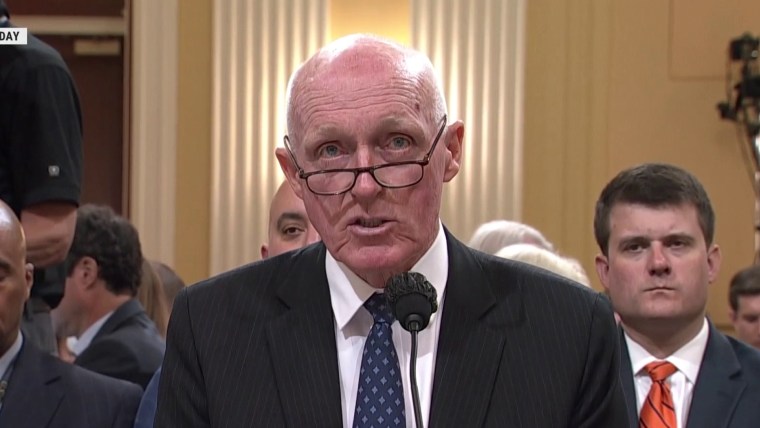When Rusty Bowers took the stand in Tuesday’s Jan. 6 congressional listening to, he riveted hundreds of thousands along with his testimony about Donald Trump’s deliberate election sabotage. Bowers, the Republican Arizona Home speaker, described how Trump and Rudy Giuliani requested him to assist appoint phony electors in 2020 — and the way he turned them down flat. Bowers careworn that he’d by no means break the vow he took to uphold the Structure. “For me to do this as a result of any individual simply requested me to is international to my very being,” he mentioned. “I cannot do it.”
But the day earlier than, in an interview with The Related Press, Bowers threw a curveball. Regardless of bravely talking out in opposition to Trump’s election interference, he insisted he’d nonetheless vote for him in 2024. “If he’s the nominee, if he was up in opposition to Biden, I’d vote for him once more,” Bowers mentioned. “Just because what he did the primary time, earlier than COVID, was so good for the nation. For my part it was nice.”
Bowers’ selection to remain on the Trump practice because it hurtles towards a cliff might sound baffling. From a psychological standpoint, although, it’s not all that stunning.
The gist of the ensuing on-line furor was: Holy cognitive dissonance, Batman. How might Bowers probably again a candidate who — as his personal testimony so clearly confirmed — flouted the rule of legislation and shook the nation’s democratic foundations?
Bowers’ selection to remain on the Trump practice because it hurtles towards a cliff might sound baffling. From a psychological standpoint, although, it’s not all that stunning. It’s one factor to attract an ethical line and refuse to endorse faux electors. Nevertheless it’s fairly one other to surrender the political tribe you’ve supported a lot of your life — a pillar of attitudes, values and beliefs that props up key points of your identification.
As Bowers thought-about Giuliani and Trump’s scheme to nominate new Arizona electors, he confronted one clear-cut query: Is that this authorized, or isn’t it? After figuring out that the scheme was unlawful, he concluded fairly rightly that greenlighting it might imply breaking his oath of workplace. In accordance along with his resolution, he took a stand in opposition to Trump’s actions that earned him the John F. Kennedy Profile in Braveness Award this yr.
However even for brave folks like Bowers, disavowing a complete political get together and its present standard-bearer is a tall psychological order. As soon as we purchase right into a sure narrative concerning the world — one stating, as an illustration, that huge authorities is unhealthy, decrease taxes are good and immigration is suspect — we interact in what’s referred to as motivated reasoning to uphold that narrative.
Out of a want for stability and well-being, we embrace arguments that assist our view of the world and discard people who don’t. In examine after examine, folks favor to search out proof that confirms their political or ethical beliefs whereas steering round proof that threatens these beliefs.
Turning towards the acquainted and accepted could be an important survival ability since people thrive in cooperative teams the place folks principally agree about one of the best ways to dwell. For our hunter-gatherer ancestors, abandoning the tribe might imply loss of life, and breaking with our communities can really feel simply as threatening at this time. “Fairly actually, our views and opinions might assist defend us, hold us secure,” wrote threat notion knowledgeable David Ropeik. “Small marvel, then, that we struggle so laborious to maintain these partitions robust and tall.”
Bowers isn’t any exception to this rule. To reject the phony elector scheme, he solely needed to clear a single ethical hurdle. However to reject the Republican Occasion and its future nominee, even when it’s Trump, he’d need to jettison many years price of assumptions about which concepts and persons are invaluable and which aren’t. He’d additionally upend lifelong relationships with individuals who share his views.
This broad disavowal wouldn’t be as perilous as deserting the tribe with savannah predators in scorching pursuit. Nevertheless it would contain taxing psychological work, requiring Bowers to assemble a brand new net of social connections, reassess values he’s taken with no consideration and redefine his place within the political scene. It’s loads simpler for Bowers to remain cocooned in “my get together it doesn’t matter what” pondering — even when his Trump assist appears totally contradictory — than to try this type of identification overhaul.
That’s to not say Bowers, and others like him, shouldn’t attempt. Motivated reasoning permits folks to really feel safe and preserve their social ties, however it may well additionally twist them in logical knots and tank their credibility, as Bowers’ Related Press interview confirmed. And whereas the human want to verify pre-existing views could be robust, folks can be taught to overcome their very own biases by exposing themselves to information that refute their entrenched beliefs.
Till extra politicians settle for this problem, although, we’re more likely to see a gentle procession of officers like Bowers: keen to place their lives on the road to talk up about corruption, however unwilling to query the concepts and beliefs that fueled that corruption within the first place.

